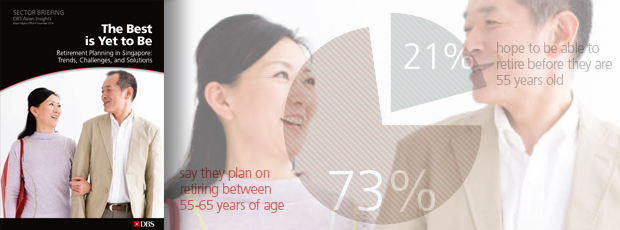11/28/2014
Singapore / Retirement

Singapore’s demographic mix is rapidly ageing. While most Singaporeans expect to retire well, many are leaving it too late to make their hopes a reality. How do you meet the financial challenges that will come with the "retiree boom"?
Asia is fast growing older. Its number of elderly persons is expected to triple from 438 million in 2010 to more than 1.26 billion by 2050. By then, almost two-thirds of the world’s older persons will be living in the region, with one in four people being over the age of 60. The proportion of "oldest-old" – those above 80 years – is also expected to increase and constitute 19% of the older persons in the region by 2050.
This unprecedented "retiree boom" or "silver tsunami" threatens to negatively affect retirement income security.
Indeed, many of Asia’s retirement income systems are not prepared for rapid population ageing. More prosperous Asian countries are having fewer babies, shorter marriages, and longer lives. Combined with generally low retirement ages, this demographic transition is already leading to the number of pension recipients outnumbering the number of contributors in certain developed Asian economies.
And, as this unfolds, responsibility for retirement income security is increasingly falling on the shoulders of individuals, instead of the state alone. As an advanced economy, Singapore faces these sorts of issues.
A new DBS Asian Insights report “The Best is Yet to Be” explores the shifts that are becoming a major challenge for Asia as a whole, and Singapore in particular.
While most Asians, including Singaporeans, hold high expectations for their retirement years, many are leaving it too late to make their hopes a reality. Almost three-quarters of Singaporeans, for example, plan to retire between 55 and 65, and 85% expect to receive an average of S$3,500 per month for 15 to 20 years or more. But only a quarter of them have implemented a financial plan to make that happen, while another quarter are in the planning stage.
The result of being unprepared is a yawning gap between how much many Singaporeans will have saved and the amount required to finance their retirement expectations. Many believe they will need around S$500,000 to get them through an average retirement period of 18 years. But in reality, that sum will last for only 12 years, with a shortfall of S$250,000.
The report finds there are several reasons why Singaporeans are failing to prepare for their post-work years. Many see retirement planning as an intimidating task. Others are confused over the variety of financial products to choose from. And, then there are those who feel they do not have enough initial funds to make a proper start.
Ironically, this lack of planning comes at a time of growing possibilities. There any number of ways personal assets, savings and investments can be mobilised that are both sustainable and durable.
The report’s concluding remarks focus on recommendations for individuals and households to work hand-in-hand with the banking sector to enhance their retirement planning strategies. From starting to save as early as possible to planning with a trusted support framework, there are many ways to reach the best that is yet to be.
To read the full report, download the PDF.



